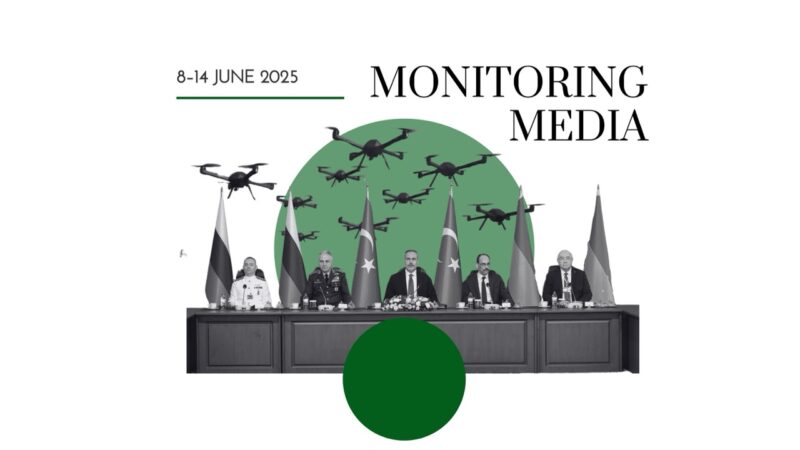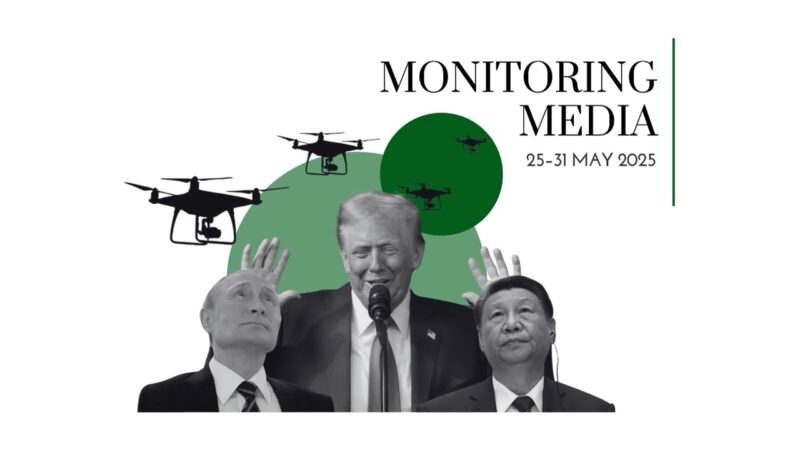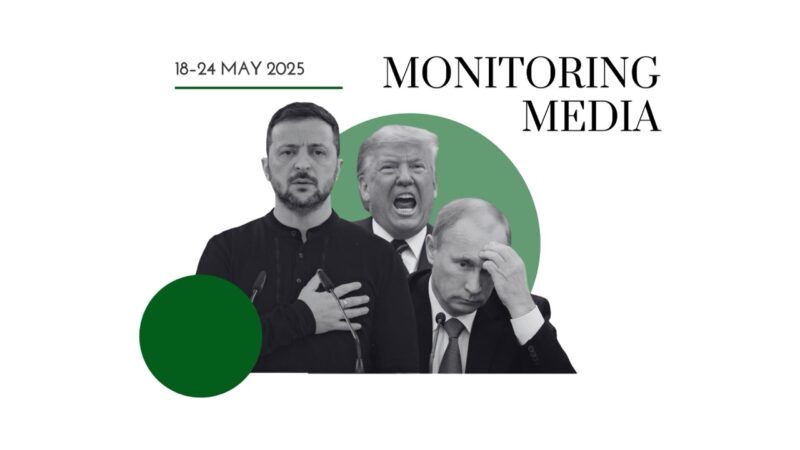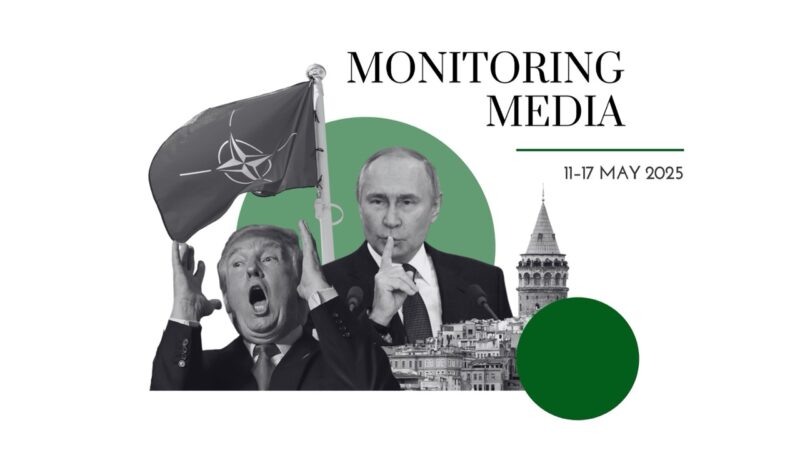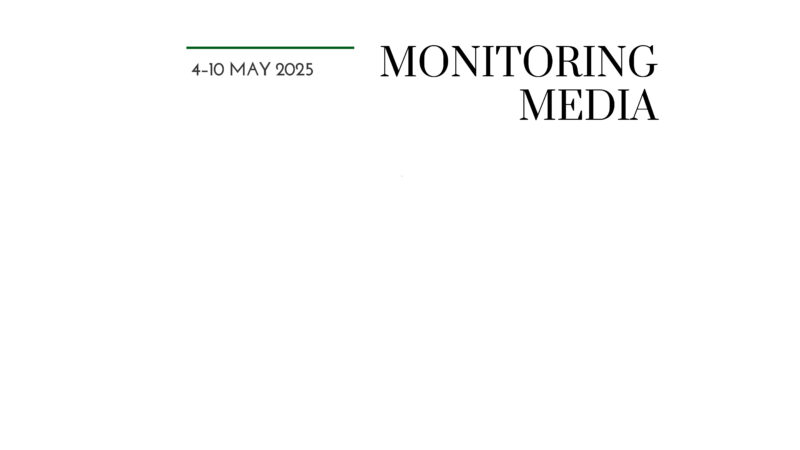Ukraine accelerates reforms regardless of the war

CIUS weekly report on North American media coverage of Ukrainian affairs, 27 May–2 June 2023
Three publications (Atlantic Council, Politico, and The National Interest) were selected to prepare this report on how the situation in Ukraine has been portrayed in the North American press during the past week (27 May–2 June 2023). The sample was compiled based on their impact on public opinion as well as on their professional reputation, popularity among the readership, and topical relevance. These three publications represent centrist and conservative viewpoints on the political spectrum.
This report covers only the most-read and relevant articles about Ukraine, as ranked by the respective North American publications themselves in the past week. Its scope covers promoted articles on home pages and articles from special sections on Ukraine, with the hashtag #Ukraine, from the paper editions of the publications, and about Ukraine from opinion columns and editorials.
Topics featured in the selected articles:
- Ukraine’s current affairs: Ukraine’s economy stands strong but requires reforms; Ukrainian achieves state-of-the-art wartime diplomacy; “Diia” e-government platform is one of the world’s best; Ukraine persistently combating corruption in the judiciary;
- The world and Ukraine: US’s Ukraine refugee support program has major flaws; US might have baselessly criticized South Africa for arming Russia;
- Russia at war: Putin’s decision to invade Ukraine threatens his political legacy; Russian oligarchs remain loyal to the Kremlin.
Main arguments:
Ukraine’s economy requires urgent reforms that will lead to its further liberalization. David Clark (Atlantic Council) argues that if Ukraine desires to join the EU and remain competitive in the market there, its government must reduce the presence of the state in economic processes. Clark opens his articles with encouraging news: according to the European Commission, the war-torn economy of Ukraine is faring well and demonstrating signs of recovery. Moreover, regardless of the unceasing Russian aggression Ukrainians are reconstructing their country on the go and are willing to do more. At the same time, “the Commission forecast identifies a number of specific reform goals, including reducing the much-increased role of the state in the economy, solving the endemic issue of corruption, improving the efficiency of the judiciary, and strengthening the enforceability of property rights.” These problems are very interconnected, and resolving them will require coordination of reforms across diverse fields. Among the crucial reforms, Clark specifies that firstly “Ukraine will need to pivot away from war economy measures toward a strategy of private sector growth.” The state is responsible for one-tenth of Ukraine’s output and about 18 percent of employment, which is too much. Secondly, the nationalization of businesses with ties to Russia, especially banks, should not be automatically accomplished through their transfer to Ukraine’s state ownership. A more sophisticated and balanced mechanism that upholds property rights, relies on legal procedures, and involves private actors should be considered. Thirdly, ties between political and economic stakeholders must be severed to eradicate corruption at the highest state level. In other words, a genuine de-oligarchization should be completed: “Ukrainian President Volodymyr Zelensky must resist the temptation to use patronage to create a business class loyal to him.”
Ukrainian officials set benchmarks for wartime diplomacy. Yuna Potomkina (Atlantic Council) discusses the specificity of Ukraine’s current diplomatic efforts and outlines the reasons behind its effectiveness. Potomkina claims that Ukrainian officials have learned a few important lessons since late February 2022—primarily, the importance of seizing the moment, acting quickly and decisively instead of falling into panic. Setting an example, President Zelensky has demonstrated time and time again how a person should react to and behave in unfavourable circumstances. Secondly, the adoption of “an interest-oriented approach to building international alliances by focusing on the underlying interests of each party.” Ukrainian officials have found a way to convince the West of the global importance of their struggle, unite powerful allies around their cause, address European security interests, and appeal to shared democratic values. Thirdly, the government in Kyiv has demonstrated diplomatic perseverance and an incremental approach to negotiations. Instead of putting pressure on their allies to get all the needed support at once, Ukrainian officials have always been thankful for everything they’ve received yet unrelentingly lobbied for more and worked on new favourable opportunities: “Perhaps the best single example of the incremental approach was the creation of a ‘tank coalition’ to provide Ukraine with Leopard 2 main battle tanks.” Fourth is the clear and consistent communication of Ukraine’s position on peace talks: the government in Kyiv has always insisted that the only way to resolve the war is to liberate all the occupied territories—this position has never changed, and it was eventually accepted by Ukraine’s international allies.
Ukraine’s electronic government platform “Diia” gains international acknowledgement. Anatoly Motkin (Atlantic Council) analyzes the functionality of Ukraine’s “Diia” platform and claims that it has set a benchmark for similar software across the globe. According to USAID Administrator Samantha Power, “users of ‘Diia’ can digitally access the kinds of state services that US citizens can only dream of, including crossing the border using a smartphone application as a legal ID, obtaining a building permit, and starting a new business.” Users of “Diia” have almost immediate access to 25 different public services. Apart from reducing the bureaucratic burden for the citizens of Ukraine, the platform also helps the government in Kyiv to fight corruption and respond to Russian aggression. Citizens who have become direct victims of the invasion may request evacuation documents (including the world’s first digital passport) and report property damage through “Diia.” All Ukrainians can use “Diia” to report the location and movement of Russian troops or watch national television in occupied areas where the regular broadcasting was cut off. Motkin argues that “‘Diia’ is widely seen as the world’s first next-generation e-government platform, and is credited with implementing what many see as a more human-centric government service model.” At the same time, one of the major challenges to e-government platforms across the globe is the necessity to combine user-friendliness with the solid protection of personal data. This challenge is critical for Ukraine, because its cyber infrastructure is enduring unceasing attacks from Russian hackers. Motkin concludes that “the success of the IT industry in Ukraine over the past decade has already changed international perceptions of the country. Instead of being primarily seen as an exporter of metals and agricultural products, Ukraine is now increasingly viewed as a trusted provider of tech solutions.”
Ukraine making advances in combating courtroom corruption, but many challenges persist. Olena Halushka (Atlantic Council) writes about the recent and very vocal case of the detention of Vsevolod Kniaziev, the head of Ukraine’s Supreme Court, based on a charge of an alleged $2.7 million bribe. The charges were brought by Ukraine’s leading anti-corruption bodies, the Special Anti-Corruption Prosecutor’s Office and the National Anti-Corruption Bureau of Ukraine. The case of Kniaziev is not unique: during the last three years (since the creation of Ukraine’s High Anti-Corruption Court), 23 judges have been convicted. However, as Halushka highlights, the detention of corrupt judges is only the tip of the iceberg and a reactive measure; much more needs to be done in order to reform the national judicial system. First, appointments to Ukraine’s Supreme Court must be made with even higher transparency and independence, and the contribution of civil society experts and international advisers should not be ignored. Otherwise, the public reputation of the Supreme Court will continue to remain low. Second, the country’s key judicial governance bodies (the High Council of Justice and the High Qualification Commission of Judges) should include more change agents from civil society and fewer members with questionable reputations. Third, the selection procedure of Constitutional Court judges should be improved and de-politicized. This will not only help to meet the requirements for EU accession but also solidify the rule of law across the country and prevent political actors from using the Constitutional Court as a veto tool in their internecine battles. Finally, “some anti-corruption initiatives that were justifiably put on hold following the start of Russia’s full-scale invasion must now be revived. This includes asset declarations for all state officials.” The revival of these initiatives is recommended by the International Monetary Fund and EU Ambassador to Ukraine, Matti Maasikas.
US support program for relocated Ukrainian refugees has many drawbacks. Nayla Rush (National Interest) describes the US regulations regarding refugees and highlights that they have recently become arbitrary. In particular, with respect to Ukrainians who have fled the war, Rush writes that they often face hard times after their move to the US. The national support program “Uniting for Ukraine” requires the local benefactors to provide constant financial support to Ukrainian refugees. This does not always happen: the sponsors of Ukrainians often bail on them, and many newcomers end up homeless. The situation is especially bitter considering the fact that Ukrainian refugees usually fly to the US from Europe, where they enjoy substantial government support: “Actually, this ‘American welcome’ could very well be a poisoned gift to many of those who are leaving Europe and its numerous protection benefits,” which include “a residence permit, access to employment, housing, social welfare, medical treatment, [and] education.” Rush concludes that “for the most part, the program [of US support to Ukrainian refugees] does not offer a ‘life-saving’ way out of Ukraine’s war zones.”
US suspicion of South Africa in providing arms to Russia requires further scrutiny. Nahal Toosi (Politico) discusses a diplomatic scandal that erupted between the US and South Africa after the US ambassador to the latter expressed an opinion that Pretoria sent a ship filled with weapons to Russia to help in its war effort against Ukraine. According to Toosi, “it was a shocking assertion by an American official against a country that the United States has been trying to court in the global effort to isolate Russia.” This allegation risks damaging the US’s global interests in the long run, especially considering the active political advancements of Russia and China on the African continent. To introduce more clarity, Toosi narrates a story of a Russian cargo vessel loaded with ammunition, “the Lady R,” which spent a few days docked in South Africa’s Simon’s Town naval base in December 2022. The US ambassador assumed then that the vessel might have been loaded with more ammunition to be shipped to Russia, while the government in Pretoria insisted that the vessel delivered ammunition to its own national army. The scandal acquires a different sounding if placed into the context of South Africa’s abstention from two major UN General Assembly resolutions criticizing Russia for the war, as well as hosting in 2023 Russian Foreign Minister Sergey Lavrov and participating in naval exercises with Russia and China. Toosi concludes that “among many Americans who’ve dealt with South Africa, there’s a sense that the country wants to benefit from U.S. ties while undermining U.S. interests; that South Africa’s leaders are hypocritical when they harp on respect for sovereignty but say nothing when Russia violates Ukraine’s; that they excessively emphasize diplomatic protocol as a way to obfuscate; and that rampant corruption is affecting their decisions.”
Putin’s authorization of the invasion of Ukraine has undermined his status and political legacy. Peter Dickinson (Atlantic Council) discusses the probability of Putin’s in-person attendance at the BRICS summit in South Africa in August this year. The danger that looms ahead for Russia’s president is being detained as a wanted suspect in war crimes under a warrant from the International Criminal Court. Because South Africa is one of the signatories of the Rome Statute, which established the International Criminal Court, its law enforcement officers would be obliged to detain Putin just as he arrives. Even if granted diplomatic immunity by the government of South Africa (which is unlikely), Putin risks detention when landing in any other country along the way. Dickinson stresses that “ten years ago, Putin was a member of the elite G8 group of world leaders and a permanent fixture at the top table of international affairs. Today, he is a wanted war crimes suspect who cannot leave his own country without first checking that he will not end up in jail.” Moreover, Putin’s isolation appears even more humiliating in light of the respect that President Zelensky enjoys across the world, in Rome, Berlin, Paris, and London. Zelensky also “grabbed the headlines at the Arab League summit in Saudi Arabia and was the center of attention at the G7 summit in Japan.” On top of that, Putin’s criminal charges and diplomatic isolation constrain the mobility of all Russian elites who are close to him, as well as harm ordinary Russians who have to endure sanctions. Dickinson highlights that as an amateur historian, “Putin must be painfully aware that he has brought his own country to one of its lowest points in centuries.” Falling into the trap of his individual misconceptions, Russia’s President authorized the invasion of Ukraine, which turned out to be disastrous for constructing any kind of positive political legacy for him.
Russian political elites and oligarchs demonstrate extraordinary resilience to Western sanctions. Mariya Y. Omelicheva and Alexander Sukharenko (National Interest) argue that “Western sanctions against Russian oligarchs have failed because the Kremlin has proven quite adept at circumventing or nullifying their effects.” Since February 2022, around forty countries have applied a broad array of restrictions and limitations against Russian businesses and individuals. The idea behind them was to discourage Russian oligarchs from supporting aggressive Kremlin policies and encourage them to steer Putin’s decisions into a more constructive stream. However, the outcome of the sanctions became exactly the opposite. The collective net worth of Russian oligarchs increased, and so has their number; moreover, they got connected to the Kremlin even tighter instead becoming alienated from it. The authors mention that the design of Western sanctions did not consider Putin’s “social contract” with the Russian oligarchs, which was established back in the 2000s: “In exchange for their loyalty and political non-interference, Putin promised the oligarchs that his government would stand by the results of the chaotic privatization of the 1990s that enriched Russia’s post-Soviet elite.” Therefore, in the following two decades the loyalists who pledged their allegiance to the president became the regime’s benefactors. This “social contract” has remained unchallenged to date. The loyal oligarchs have been allowed to privatize the property and assets of foreign companies that left the Russian market after February 2022. Recent updates to the Russian tax code have softened the punishment for tax evasion and exempted “sanctioned individuals from paying personal income tax and other taxes on [their] frozen income and assets.” On the other hand, disloyal oligarchs face mortal dangers: “A total of thirty-nine influential Russian figures, including fifteen Russian business leaders and executives, have died under mysterious circumstances.” Omelicheva and Sukharenko conclude that for major changes in Russia’s political architecture to appear, Western countries and their allies need to take a few additional steps. Firstly, they must develop a legal solution that will allow to “simplify and expedite the seizure of the Russian tycoons’ assets for their use for Ukraine’s benefit.” Second, they must work “to garner the political will to close loopholes for tax evasion and anti-money laundering mechanisms.”
